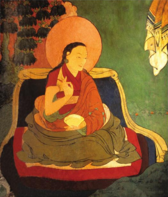| Part of a series on |
| Women in society |
|---|
 |
| Part of a series on |
| Buddhism |
|---|
 |
Women in Buddhism is a topic that can be approached from varied perspectives including those of theology, history, anthropology, and feminism. Topical interests include the theological status of women, the treatment of women in Buddhist societies at home and in public, the history of women in Buddhism, and a comparison of the experiences of women across different forms of Buddhism. As in other religions, the experiences of Buddhist women have varied considerably.
Scholars such as Bernard Faure and Miranda Shaw are in agreement that Buddhist studies is in its infancy in terms of addressing gender issues. Shaw gave an overview of the situation in 1994:
In the case of Indo-Tibetan Buddhism some progress has been made in the areas of women in early Buddhism, monasticism and Mahayana Buddhism. Two articles have seriously broached the subject of women in Indian tantric Buddhism, while somewhat more attention has been paid to Tibetan nuns and lay yoginis.[1]
However Khandro Rinpoche, a female lama in Tibetan Buddhism, downplays the significance of growing attention to the topic:

When there is a talk about women and Buddhism, I have noticed that people often regard the topic as something new and different. They believe that women in Buddhism has become an important topic because we live in modern times and so many women are practicing the Dharma now. However, this is not the case. The female sangha has been here for centuries. We are not bringing something new into a 2,500-year-old tradition. The roots are there, and we are simply re-energizing them.[2]
Masatoshi Ueki conducted a comprehensive evaluation of the status of women and gender equality in Buddhism, which was grounded in a diachronic textual analysis of Chinese Buddhist literature from Early Buddhism to the Lotus Sutra. Ueki employed a nuanced interpretation of the terms 'male' and 'female' beyond mere biological characteristics, instead emphasizing their functional roles within society, which he referred to as the 'male principle' or Yang qualities and 'female principle' or Yin qualities. His investigation culminated in the conclusion that Shakyamuni's teachings make no distinction regarding women's enlightenment, thus asserting gender equality in Buddhism.
The establishment of the male principle in equal measure with the female principle is the natural order of things. They should never exist in a mutually exclusive relationship. They should not be an emphasis on one at the expense of the other, for both are indispensable. ... will the establishment of the true self be a fact of reality for both men and women.[3]
- ^ Shaw, Miranda (1994). Passionate Enlightenment: Women in Tantric Buddhism. New Jersey: Princeton University Press. p. 4. ISBN 978-0-691-01090-8.
- ^ Rinpoche, Khandro (1999). Thubten Chodron, Sylvia Boorstein (ed.). Blossoms of the Dharma: Living as a Buddhist Nun. North Atlantic Books. p. 171. ISBN 978-1-55643-325-2.
- ^ Masatoshi, Ueki (2001). Gender Equality in Buddhism. New York: Peter Lang. p. 191. ISBN 978-0-8204-5133-6.




